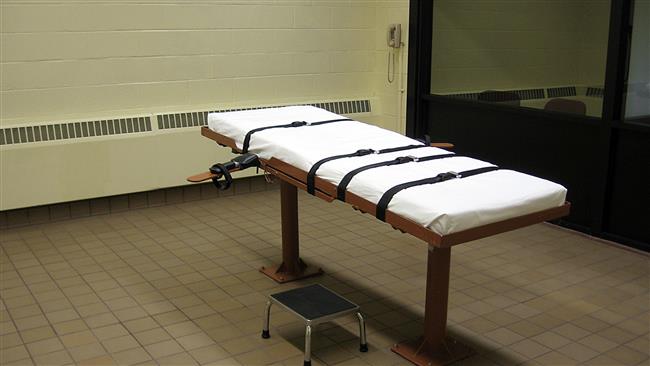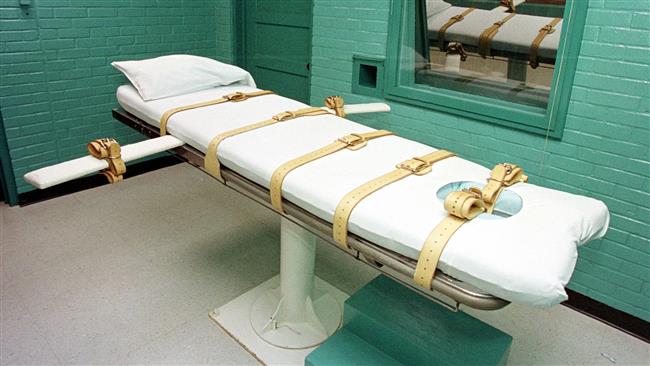Ohio delays another execution after struggling to find a vein
The Ohio government called off the execution of a 69-year-old convicted murderer after it was under way on Wednesday because officials could not find a suitable vein in the inmate, who is sick with cancer and other diseases, state officials said.
Alva Campbell Jr., who also suffers from lung disease, asthma and heart problems and uses a walker and colostomy bag, had argued through his lawyer that he was too sick for a lethal injection, but lost a bid to be killed by a firing squad instead.
It was the fifth mishandled execution in Ohio in recent years and the second time an attempted execution was abandoned, according to the American Civil Liberties Union of Ohio. The
advocacy group, which opposes the death penalty, called for an immediate moratorium on executions in the state.
"This is not justice, and this is not humane," Mike Brickner, the group's policy director, said in a statement.
"Campbell was poked and prodded for nearly two hours as prison officials and medical personnel attempted to find a useable vein."
Ohio's Department of Rehabilitation and Correction said Ohio Governor John Kasich had agreed to a temporary reprieve.
"Attempts by the medical team this morning to gain intravenous access were unsuccessful," JoEllen Smith, a department spokeswoman, said in a statement. "A new execution
date will be set in the formal reprieve documents issued later today."
Journalists who witnessed the execution attempt said medical staff tried to inject Campbell twice in each arm and once in his right leg, the Columbus Dispatch newspaper reported. Campbell
appeared to cry at one point, it said, and each of the medical officials shook his hand after the execution was called off.
On Tuesday, the US Supreme Court rejected a final appeal by Campbell to stop the execution at the Southern Ohio Correctional Facility in Lucasville. David Stebbins, Campbell's
lawyer, had argued that Campbell's medical conditions could make it hard to find suitable veins to inject. Kasich, the Republican governor, had earlier rejected clemency for Campbell, who has said he was beaten and abused as a child.
Campbell served 20 years of a life sentence for killing a man in Cleveland before being released by a parole board in 1992. Five years after his release, he was arrested and jailed for robbery in Columbus, Ohio, and was awaiting a court date when he faked paralysis, according to court documents.
As a deputy was transporting Campbell in a wheelchair to the courthouse, he suddenly beat the deputy, stole her pistol and fled, according to court records. He then car-jacked and fatally
shot 18-year-old Charles Dials. Campbell was convicted in 1997 on robbery and murder charges.
Dials' brother, Joseph Dials, his sister, Kayela Dials, and an uncle, Michael Brewer, were present to witness the attempted execution, the Dispatch reported. Campbell had been the latest inmate to challenge Ohio's lethal injection methods.
In September, Ohio put to death a double murderer, Gary Otte, in its second execution after a three-year hiatus because of legal challenges and difficulties obtaining lethal injection drugs.
Otte was put to death after he lost an appeal challenging the use of midazolam as a sedative in that protocol. Several U.S. states, including Oklahoma and Arizona, have used midazolam in executions in which witnesses said inmates appeared to twist in pain.
Twenty-four more inmates after Campbell are slated for execution in Ohio through 2022. Among them is Romell Broom, a convicted murderer who left the execution chamber alive in 2009 after officials could not find a suitable vein. Broom is scheduled to return to the chamber in 2020.
(Source: Reuters)
VIDEO | Press TV's news headlines
July 26: ‘Axis of Resistance’ operations against Israeli occupation
Palestinian resistance fighters hit Israeli Merkava 4 tanks
VIDEO | UK police brutal assault on Muslim family sparks outrage, protests
Hamas: Death of leader in Israeli jail amounts to murder
EU sends €1.5 billion to Ukraine from frozen Russian assets
VIDEO | Millions of Yemenis rally for Gaza, call for more anti-Israel operations
UN chief calls for Olympic truce as games begin in Paris











 This makes it easy to access the Press TV website
This makes it easy to access the Press TV website